无私奉献高考英语语法复习
- 格式:doc
- 大小:79.00 KB
- 文档页数:7
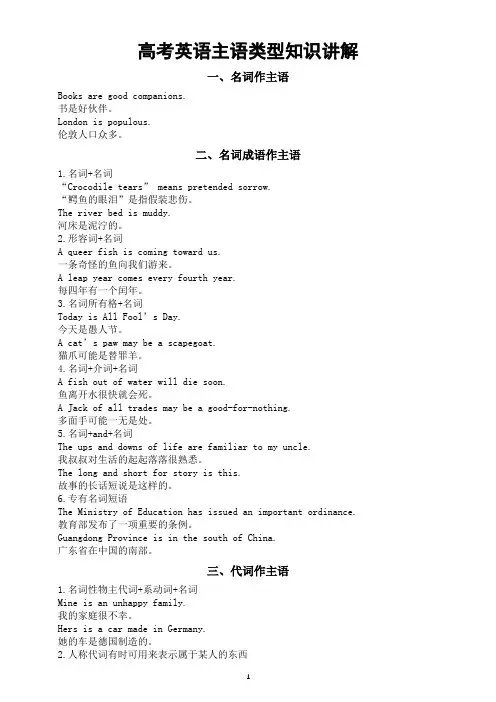
高考英语主语类型知识讲解一、名词作主语Books are good companions.书是好伙伴。
London is populous.伦敦人口众多。
二、名词成语作主语1.名词+名词“Crocodile tears” means pretended sorrow.“鳄鱼的眼泪”是指假装悲伤。
The river bed is muddy.河床是泥泞的。
2.形容词+名词A queer fish is coming toward us.一条奇怪的鱼向我们游来。
A leap year comes every fourth year.每四年有一个闰年。
3.名词所有格+名词Today is All Fool’s Day.今天是愚人节。
A cat’s paw may be a scapegoat.猫爪可能是替罪羊。
4.名词+介词+名词A fish out of water will die soon.鱼离开水很快就会死。
A Jack of all trades may be a good-for-nothing.多面手可能一无是处。
5.名词+and+名词The ups and downs of life are familiar to my uncle.我叔叔对生活的起起落落很熟悉。
The long and short for story is this.故事的长话短说是这样的。
6.专有名词短语The Ministry of Education has issued an important ordinance. 教育部发布了一项重要的条例。
Guangdong Province is in the south of China.广东省在中国的南部。
三、代词作主语1.名词性物主代词+系动词+名词Mine is an unhappy family.我的家庭很不幸。
Hers is a car made in Germany.她的车是德国制造的。
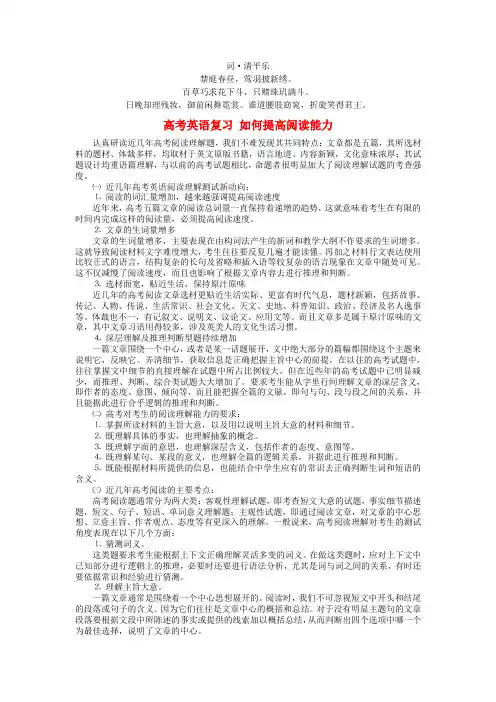
词·清平乐禁庭春昼,莺羽披新绣。
百草巧求花下斗,只赌珠玑满斗。
日晚却理残妆,御前闲舞霓裳。
谁道腰肢窈窕,折旋笑得君王。
高考英语复习如何提高阅读能力认真研读近几年高考阅读理解题,我们不难发现其共同特点:文章都是五篇,其所选材料的题材、体裁多样,均取材于英文原版书籍,语言地道、内容新颖,文化意味浓厚;其试题设计均重语篇理解,与以前的高考试题相比,命题者很明显加大了阅读理解试题的考查强度。
㈠近几年高考英语阅读理解测试新动向:⒈阅读的词汇量增加,越来越强调提高阅读速度近年来,高考五篇文章的阅读总词量一直保持着递增的趋势,这就意味着考生在有限的时间内完成这样的阅读量,必须提高阅读速度。
⒉文章的生词量增多文章的生词量增多,主要表现在由构词法产生的新词和教学大纲不作要求的生词增多。
这就导致阅读材料文字难度增大,考生往往要反复几遍才能读懂。
再加之材料行文表达使用比较正式的语言,结构复杂的长句及省略和插入语等较复杂的语言现象在文章中随处可见。
这不仅减慢了阅读速度,而且也影响了根据文章内容去进行推理和判断。
⒊选材面宽,贴近生活,保持原汁原味近几年的高考阅读文章选材更贴近生活实际、更富有时代气息,题材新颖,包括故事、传记、人物、传说、生活常识、社会文化、天文、史地、科普知识、政治、经济及名人逸事等。
体裁也不一,有记叙文、说明文、议论文、应用文等。
而且文章多是属于原汁原味的文章,其中文章习语用得较多,涉及英美人的文化生活习惯。
⒋深层理解及推理判断型题持续增加一篇文章围绕一个中心,或者是某一话题展开,文中绝大部分的篇幅都围绕这个主题来说明它,反映它。
弄清细节,获取信息是正确把握主旨中心的前提。
在以往的高考试题中,往往掌握文中细节的直接理解在试题中所占比例较大。
但在近些年的高考试题中已明显减少,而推理、判断、综合类试题大大增加了。
要求考生能从字里行间理解文章的深层含义,即作者的态度、意图、倾向等,而且能把握全篇的文脉,即句与句、段与段之间的关系,并且能据此进行合乎逻辑的推理和判断。
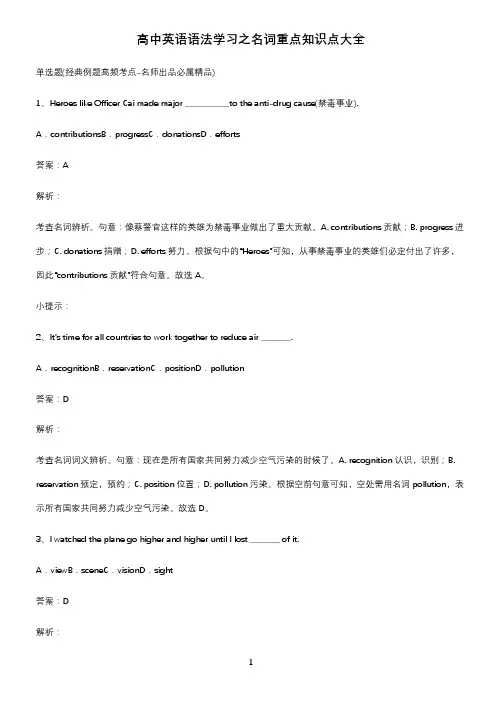
高中英语语法学习之名词重点知识点大全单选题(经典例题高频考点-名师出品必属精品)1、Heroes like Officer Cai made major ____________to the anti-drug cause(禁毒事业). A.contributionsB.progressC.donationsD.efforts答案:A解析:考查名词辨析。
句意:像蔡警官这样的英雄为禁毒事业做出了重大贡献。
A. contributions贡献;B. progress进步;C. donations捐赠;D. efforts努力。
根据句中的“Heroes”可知,从事禁毒事业的英雄们必定付出了许多,因此“contributions贡献”符合句意。
故选A。
小提示:2、It's time for all countries to work together to reduce air ________. A.recognitionB.reservationC.positionD.pollution答案:D解析:考查名词词义辨析。
句意:现在是所有国家共同努力减少空气污染的时候了。
A. recognition认识,识别;B. reservation预定,预约;C. position位置;D. pollution污染。
根据空前句意可知,空处需用名词pollution,表示所有国家共同努力减少空气污染。
故选D。
3、I watched the plane go higher and higher until I lost ________ of it. A.viewB.sceneC.visionD.sight答案:D解析:考查名词词义辨析。
句意:我看着飞机越飞越高,直到它消失在我的视线里。
根据句子分析可知,此处表示“看不见……”,表达为sb. lose sight of sth.。
A. view风景;B. scene场景;C. vision视觉;D. sight视野,视线。
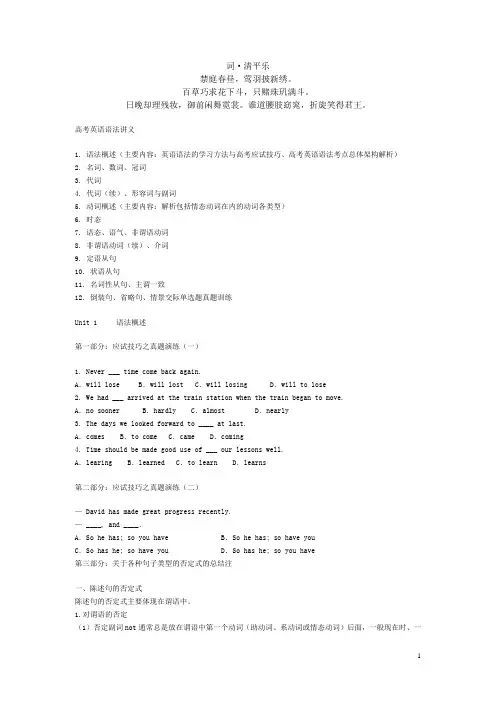
词·清平乐禁庭春昼,莺羽披新绣。
百草巧求花下斗,只赌珠玑满斗。
日晚却理残妆,御前闲舞霓裳。
谁道腰肢窈窕,折旋笑得君王。
高考英语语法讲义1. 语法概述(主要内容:英语语法的学习方法与高考应试技巧、高考英语语法考点总体架构解析)2. 名词、数词、冠词3. 代词4. 代词(续)、形容词与副词5. 动词概述(主要内容:解析包括情态动词在内的动词各类型)6. 时态7. 语态、语气、非谓语动词8. 非谓语动词(续)、介词9. 定语从句10. 状语从句11. 名词性从句、主谓一致12. 倒装句、省略句、情景交际单选题真题训练Unit 1 语法概述第一部分:应试技巧之真题演练(一)1. Never ___ time come back again.A.will lose B.will lost C.will losing D.will to lose2. We had ___ arrived at the train station when the train began to move.A.no sooner B.hardly C.almost D.nearly3. The days we looked forward to ____ at last.A.comes B.to come C.came D.coming4. Time should be made good use of ___ our lessons well.A.learing B.learned C.to learn D.learns第二部分:应试技巧之真题演练(二)— David has made great progress recently.— ____, and ____.A.So he has; so you have B.So he has; so have youC.So has he; so have you D.So has he; so you have第三部分:关于各种句子类型的否定式的总结注一、陈述句的否定式陈述句的否定式主要体现在谓语中。
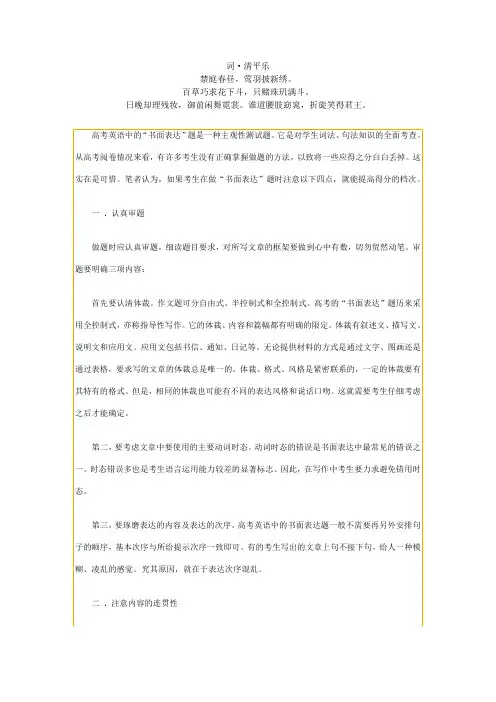
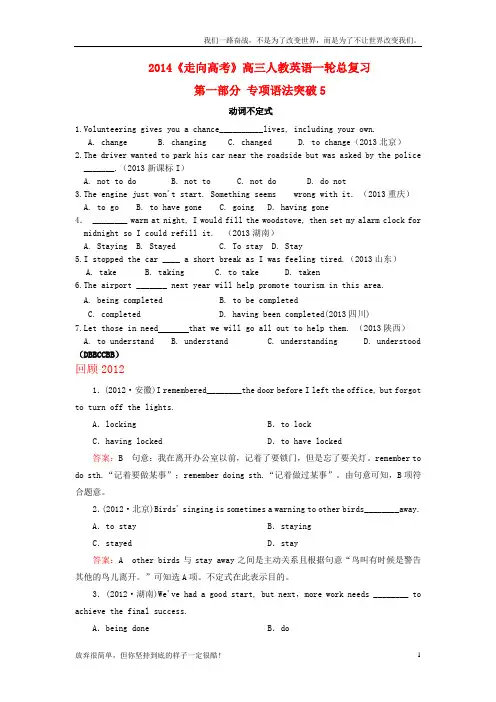
2014《走向高考》高三人教英语一轮总复习第一部分专项语法突破5动词不定式1.Volunteering gives you a chance__________lives, including your own.A. changeB. changingC. changedD. to change(2013北京)2.The driver wanted to park his car near the roadside but was asked by the police _______.(2013新课标I)A. not to doB. not toC. not doD. do not3.The engine just won't start. Something seems wrong with it. (2013重庆)A. to goB. to have goneC. goingD. having gone4. ________ warm at night, I would fill the woodstove, then set my alarm clock for midnight so I could refill it. (2013湖南)A. StayingB. StayedC. To stayD. Stay5.I stopped the car ____ a short break as I was feeling tired.(2013山东)A. takeB. takingC. to takeD. taken6.The airport _______ next year will help promote tourism in this area.A. being completedB. to be completedC. completedD. having been completed(2013四川)7.Let those in need that we will go all out to help them. (2013陕西)A. to understandB. understandC. understandingD. understood (DBBCCBB)回顾20121.(2012·安徽)I remembered________the door before I left the office, but forgot to turn off the lights.A.locking B.to lockC.having locked D.to have locked答案:B 句意:我在离开办公室以前,记着了要锁门,但是忘了要关灯。
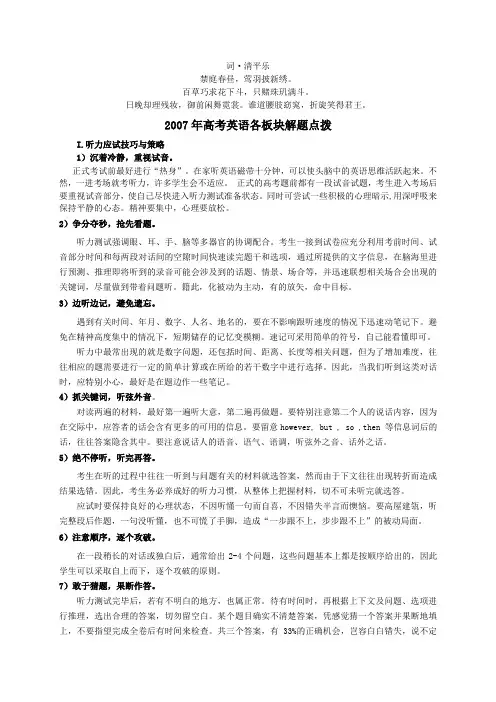
词·清平乐禁庭春昼,莺羽披新绣。
百草巧求花下斗,只赌珠玑满斗。
日晚却理残妆,御前闲舞霓裳。
谁道腰肢窈窕,折旋笑得君王。
2007年高考英语各板块解题点拨I.听力应试技巧与策略1)沉着冷静,重视试音。
正式考试前最好进行“热身”。
在家听英语磁带十分钟,可以使头脑中的英语思维活跃起来。
不然,一进考场就考听力,许多学生会不适应。
正式的高考题前都有一段试音试题,考生进入考场后要重视试音部分,使自己尽快进入听力测试准备状态。
同时可尝试一些积极的心理暗示,用深呼吸来保持平静的心态。
精神要集中,心理要放松。
2)争分夺秒,抢先看题。
听力测试强调眼、耳、手、脑等多器官的协调配合。
考生一接到试卷应充分利用考前时间、试音部分时间和每两段对话间的空隙时间快速读完题干和选项,通过所提供的文字信息,在脑海里进行预测、推理即将听到的录音可能会涉及到的话题、情景、场合等,并迅速联想相关场合会出现的关键词,尽量做到带着问题听。
籍此,化被动为主动,有的放矢,命中目标。
3)边听边记,避免遗忘。
遇到有关时间、年月、数字、人名、地名的,要在不影响跟听速度的情况下迅速动笔记下。
避免在精神高度集中的情况下,短期储存的记忆变模糊。
速记可采用简单的符号,自己能看懂即可。
听力中最常出现的就是数字问题,还包括时间、距离、长度等相关问题,但为了增加难度,往往相应的题需要进行一定的简单计算或在所给的若干数字中进行选择。
因此,当我们听到这类对话时,应特别小心,最好是在题边作一些笔记。
4)抓关键词,听弦外音。
对读两遍的材料,最好第一遍听大意,第二遍再做题。
要特别注意第二个人的说话内容,因为在交际中,应答者的话会含有更多的可用的信息。
要留意however, but , so ,then 等信息词后的话,往往答案隐含其中。
要注意说话人的语音、语气、语调,听弦外之音、话外之话。
5)绝不停听,听完再答。
考生在听的过程中往往一听到与问题有关的材料就选答案,然而由于下文往往出现转折而造成结果选错。
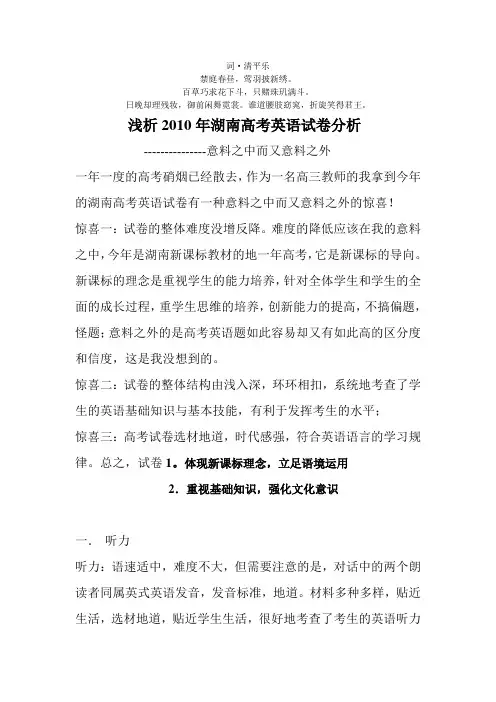
词·清平乐禁庭春昼,莺羽披新绣。
百草巧求花下斗,只赌珠玑满斗。
日晚却理残妆,御前闲舞霓裳。
谁道腰肢窈窕,折旋笑得君王。
浅析2010年湖南高考英语试卷分析---------------意料之中而又意料之外一年一度的高考硝烟已经散去,作为一名高三教师的我拿到今年的湖南高考英语试卷有一种意料之中而又意料之外的惊喜!惊喜一:试卷的整体难度没增反降。
难度的降低应该在我的意料之中,今年是湖南新课标教材的地一年高考,它是新课标的导向。
新课标的理念是重视学生的能力培养,针对全体学生和学生的全面的成长过程,重学生思维的培养,创新能力的提高,不搞偏题,怪题;意料之外的是高考英语题如此容易却又有如此高的区分度和信度,这是我没想到的。
惊喜二:试卷的整体结构由浅入深,环环相扣,系统地考查了学生的英语基础知识与基本技能,有利于发挥考生的水平;惊喜三:高考试卷选材地道,时代感强,符合英语语言的学习规律。
总之,试卷1。
体现新课标理念,立足语境运用2.重视基础知识,强化文化意识一.听力听力:语速适中,难度不大,但需要注意的是,对话中的两个朗读者同属英式英语发音,发音标准,地道。
材料多种多样,贴近生活,选材地道,贴近学生生活,很好地考查了考生的英语听力完全符合高考英语的要求:有6个what提问的问题,考查了听具体事实细节的能力-----问买什么生日礼物,干什么,说话者之间关系;有2why提问的,问原因;有2个where 提问的问地点;有一个what time ,一个when 问时间;有how far away 问距离;有hong long问时间多久;听力填空考查了:数字,电影题目,时间,电影票的种类,道路名称;二.单选继续以动词为核心来全面考查学生的重要语法知识,继续贯彻在语境中在真实的交际中考查有意义的语法应用。
考试内容项目覆盖面广,难度较高。
动词的测试题占语言知识测试的比重很大。
该节通过畅设特定适当的语境来考察考生对基本英语知识尤其是语法知识在具体语境的正确使用。
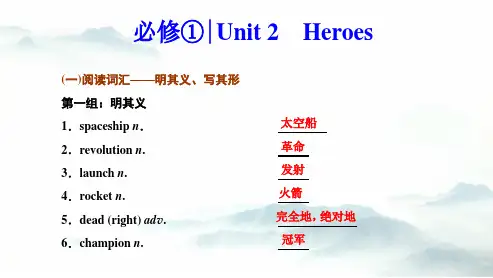
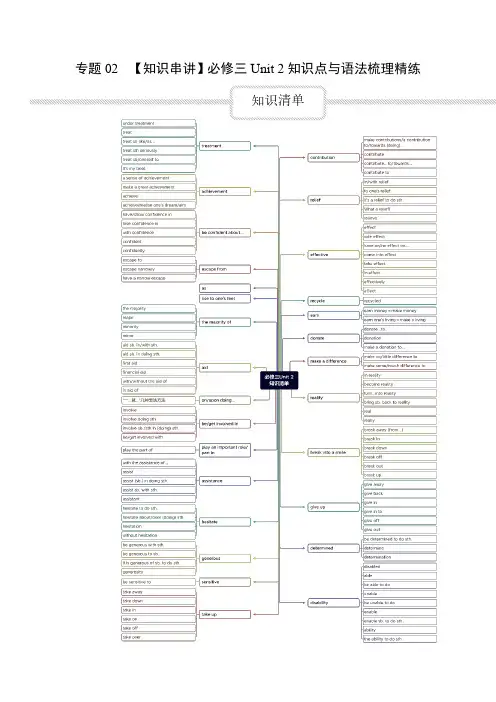
专题02【知识串讲】必修三Unit2知识点与语法梳理精练1.contribution n.贡献;捐献;稿件【教材原句】the contribution these people made to society这些人对社会的贡献make contributions/a contribution to/towards(doing)…对……作出贡献contribute v.贡献;导致;有助于;投稿contribute...to/towards...(把……)贡献给……;(向……)捐款;投稿contribute to对……作出贡献;促成,导致;有助于2.relief n.减轻,缓解;宽慰;轻松;减轻痛苦的事物【教材原句】The amount of relief and comfort experienced by the sick after the skin has been carefully washed and dried,is one of the commonest observations made at a sick bed.在病人的皮肤被仔细地清洗和晾干之后,病人所感受到的放松和舒适是在病床上最常见的观察之一。
in/with relief如释重负;松了口气to one's relief令人感到欣慰的是It's a relief to do sth.做某事是令人欣慰的What a relief!终于可以松口气了!谢天谢地!relieve v.使轻松;宽慰;缓解3.effective adj.有效的;产生预期效果的【教材原句】Now tick the solutions that you think are most effective to supply Africa with fresh water.现在选择你认为非常有效的解决方案,为非洲提供淡水。
effect n.效果,作用;影响side effect副作用have an/no effect on...对…有/没有影响come into effect开始生效take effect见效,生效in effect实际上;在实施中effectively adv.有效地affect v.影响4.recycle v.再利用,回收利用【教材原句】recycle waste water回收利用废水recycled adj.回收利用的,再生的5.earn vt.获得;赚,挣得【教材原句】At first,his plan was to earn money to build a single well somewhere in Africa.起初,他的计划是挣钱在非洲某个地方打一口井。
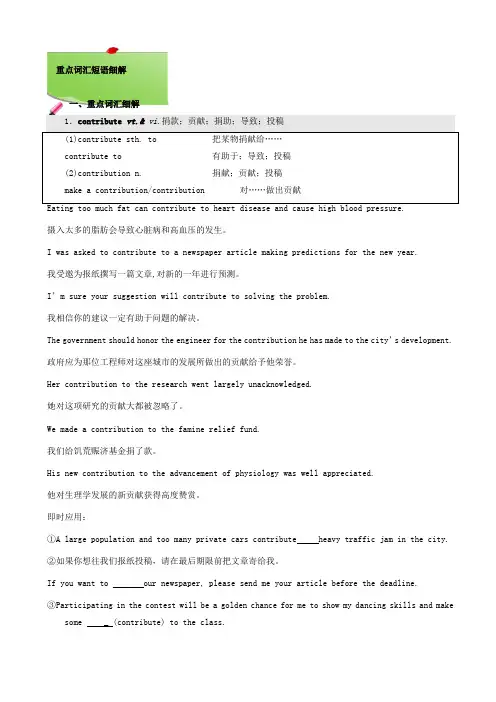
重点词汇短语细解一、重点词汇细解摄入太多的脂肪会导致心脏病和高血压的发生。
I was asked to contribute to a newspaper article making predictions for the new year.我受邀为报纸撰写一篇文章,对新的一年进行预测。
I’m sure your suggestion will contribute to solving the problem.我相信你的建议一定有助于问题的解决。
The government should honor the engineer for the contribution he has made to the city’s development. 政府应为那位工程师对这座城市的发展所做出的贡献给予他荣誉。
Her contribution to the research went largely unacknowledged.她对这项研究的贡献大都被忽略了。
We made a contribution to the famine relief fund.我们给饥荒赈济基金捐了款。
His new contribution to the advancement of physiology was well appreciated.他对生理学发展的新贡献获得高度赞赏。
即时应用:①A large population and too many private cars contribute heavy traffic jam in the city.②如果你想往我们报纸投稿,请在最后期限前把文章寄给我。
If you want to our newspaper, please send me your article before the deadline.③Participating in the contest will be a golden chance for me to show my dancing skills and makesome _ (contribute) to the class.[联想发散] 表示“引起;导致;有助于”的词语还有:cause, lead to, result in, bring about 等。
词·xx禁庭春昼,莺xx披新绣。
百草巧求花下斗,只赌珠玑满斗。
日晚却理残妆,御前闲舞霓裳。
谁道腰肢窈窕,折旋笑得君王。
浅谈xx英语高考完型和阅读解题技巧大同中学管静颖检测学生在语言方面的基础知识和运用能力是英语高考的主要目标,而完型填空和阅读理解这两部分集中体现了这两点,所以这两部分是英语高考中的重点题型,占据了较大的分值,同时也是学生容易失分的部分。
完型填空又称综合填空,是一种综合性语言测试题,它不同于单纯的语法或词汇测试题,而是要求学生从语篇的整体内容出发,借助词汇、句子结构、文化背景、上下文等来做出选择。
学生在这类题目中的失分主要是由于片面理解句子,脱离上下文所致。
因此在解题时要注意的是:一,千万不要急于下笔,必须先通读全文,再了解了文章大意后再进行解题。
二,当遇到难以判断的情况时,先不要着急,回头看看前面的文章,或者接着往下读,仔细揣摩一下前因后果,逻辑关系,作者思路等,总能找到相应的线索帮助解题。
三,就近几年的完型填空题来看,还要求学生能把握文章的整体风格。
比如在一篇文章中,有一个空格需填作者认为生活中充满了什么,经排除学生最后在“challenge”还是“misery”中犹豫,其实如果能够总揽全篇,就不难发现这是一篇励志的文章,作者的整体写作风格是明快的,在这个空格处若填入了“misery”一词,显然与文章整体格格不入,那么“challenge”就是更合适的选择。
四,答题时要注意词与词、句与句、段落与段落间的关系,比如在“social”与“economic”中间应填入的词是“culture”,与“physical”并列的就应是“mental”。
再如,要判断作者下面要讲的内容到底是承接上文的,还是转折的,或是总结概括的等等,据此来选择“however”、“and therefore”、“in a word”等相应的连接部分。
五,今年将完型填空的第一篇改为了选词填空类,其解题思路其实也大同小异,只是学生应在解题前加入一个步骤,即,将所给的单词依照词性划分归类,判断句子的结构后确定所缺词的词性,最后根据词义填入。
词·清平乐禁庭春昼,莺羽披新绣。
百草巧求花下斗,只赌珠玑满斗。
日晚却理残妆,御前闲舞霓裳。
谁道腰肢窈窕,折旋笑得君王。
2006---2007高考英语第一轮复习系列试题集高三篇(上)一.单项选择实战训练及精析:(第一组)1.It is difficult to judge what words are ______ and what words are not.A.worth to look upB.worth being looked upC.worth looking upD.worthy of looking up解析:短语be worth后面要求跟动名词形式,且用主动形式表示被动的意思,而be worthy 后的结构为of being done或to be done。
答案:C2.The brake of your bicycle has come loose.You’d better______it.A.settleB.fixC.pickD.correct解析:本题考查动词的辨析。
前一句话说明自行车闸松了,因此这里使用动词fix,表示“加固;拧紧”的意思。
答案:B3.The road sign is easy to read;the words ______ well.e outB.stand outC.goout D.keep out解析:短语stand out的意思为“突出;显眼;醒目”。
答案:B4.On the opposite wall ______ dozens of pictures______ two maps of China.A.hang;includingB.is hung;together withC.are hanged;withD.are hanging;as well as解析:从第二个空所给的四个选项来看,都可以用来连接并列成分,主语根据前面的那个词来定,including的逻辑不合适。
高三英语语法讲解及练习动名词第一部分知识透析第一节动名词的基本形式主动被动1. 一般式(not) doing(not) being done(常用来泛指一个动作,没有特别的时间意义,有时也可以表示在谓语动词之前或之后发生的动作)Swimming is her favorite sport.Learning to use electronic products is necessary in modern society.I remembered sending him an e-mail last week.He suggested taking my daughter to the zoo the next Sunday.I can’t stand being kept waiting.His not coming made everyone very disappointed.2. 完成式(not) having done(not) having been done(动名词的动作在谓语动词的动作之前发生)1 really regretted having missed such a wonderful musical.He denied having cheated in the exam.I heard of his having been chosen to be the coach of the team.I remember not having returned the book to the library.第二节动名词的用法1. 动名词作主语/表语动名词作主语/表语表示泛指的经常性的事情Collecting information is very important to businessmen.My hobby is collecting stamps.One of my bad habits is biting nails.2. 动名词作宾语1)一些动词后面只能跟动名词作宾语,如:ban consider delay deny escapefeel like finish forbid involve appreciatekeep practise recommend quit suggestadmit permit avoid enjoy mentionimagine include mind miss resistRisk prohibit allow advise encouragedislike forgive advocate postpone fancyHe denied having been there.We enjoy walking along the Bund.Don’t risk going to the forest alone.The old should avoid eating oily food.注意:allow, advise,encourage,forbid, permit,recommend 后接动名词作宾语,接不定式作补语。
词·清平乐禁庭春昼,莺羽披新绣。
百草巧求花下斗,只赌珠玑满斗。
日晚却理残妆,御前闲舞霓裳。
谁道腰肢窈窕,折旋笑得君王。
阅读理解的做题方法(1)阅读理解的做题方法(1)一、阅读应试的基本方法步骤阅读基本方法有3种,一是略读,二是精读(scrutinizing),三是寻读。
略读是一种快速阅读方法,在非常短的时间内浏览全文获得文章的中心思想和主要事实。
精读则是仔细阅读每句话,理解分析其含义,弄清句与句之间的逻辑关系,进而理解整个段落的意思。
而寻读则是通过目光扫视,迅速确定你所期望得到的信息的位置。
考试中3种基本方法可以用在不同的情况。
通过略读,我们可以了解材料的结构安排和主要信息,利用精读我们可以针对考题中的某些信息或难点做具体细致的解析,而寻读则在解题过程中起着一个定位的作用。
不少考生常常提出这样一个问题:做阅读理解题是先读文章还是先读后面的问题呢?我们认为,答案因人而异。
英语水平较高,阅读速度较快的考生可以先通读短文,一边阅读一边思考文章的主旨大意, 理解文章的细节, 基本理解原文之后再看考题及选项并做出选择,遇上个别无把握的题时再回头查阅短文的相关部分,仔细推敲定夺,以求准确无误得高分。
但这种方法只适合那些有能力获取优异成绩的考生,其优点是对文章有一个总的概念和印象,缺点是,费时间,对文章的细节记不清楚。
对于大多数考生来说,考试的时间较为紧迫,我们建议使用以下几个步骤:第一步:略读短文把握方向用尽量短的时间扫视短文,特别留意每段的第一句和最后一段的最后一句。
因为各段的主题句往往在句首,而文章的最后一句很可能是概括总结。
略读的目的是掌握短文的主旨大意,做到对全文的内容心中大致有数,有一个思考的方向。
第二步:浏览问题,有的放矢浏览5个问题,揣测出题者出此题的目的并侧重阅读短文相关部分。
由于对所问问题及文章主旨都已有所了解,在阅读时自然会知道哪些地方得细读哪些地方可一带而过甚至跳过不读。
所有问题都是根据文章内容提出的,基本反应并覆盖了文章内容的主干。
词·清平乐禁庭春昼,莺羽披新绣。
百草巧求花下斗,只赌珠玑满斗。
日晚却理残妆,御前闲舞霓裳。
谁道腰肢窈窕,折旋笑得君王。
谈英语科如何应对高中新课程背景下的高考长乐侨中骆知为了更好地服务和指导我市新课程高中英语教学工作,实现新课程教学与新高考的顺利衔接,长乐市名师工作室成员深入研究了教育部颁布的《普通高中英语课程标准(实验)》和《2008年普通高等学校招生全国统一考试大纲(课程标准试验版)》,根据省普教室提出的福建省普通高中新课程2009届毕业班教学建议,在分析我市高中英语新课程教学实际状况和我省高考英语自行命题的特点以及普通高中新课程、新高考的特点和要求的基础上,提出本学科如何应对高中新课程背景下的高考的教学建议,供大家参考。
一.对新课程背景下的高考分析(一)对我省英语自行命题试卷的评析我省高考英语试卷从2004年开始实行自行命题五年来,以“平稳过渡,稳中发展”为指导思想,根据我省高中教育发展规模的现实和高中英语教学的实际,以“四个有利”为原则,即:有利于我省高中英语教学,有利于新课程改革,有利于推进素质教育,有利于高校人才选拔;根据英语学科特点,稳步实施和推进自行命题工作。
主要呈现以下几个特点:1. 明确指导思想,实现平稳过渡五年来我省自行命题严格按照教育部颁布的2004—2008年《普通高等学校招生全国统一英语考试大纲》和我省出台的《考试说明》要求命题。
由于全国卷的大多数题型通过改革与实践检验趋于成熟。
已被广大师生广泛接受,因此,在实行新高考前,我省自行命题英语试卷题型不作变化,顺延命题传统,题目设置规范,切实做到求稳求实,有效地实现了平稳过渡。
但2009年高考题型有所变动,短文改错题改为短文填空题,所填的词有三种情况,给首字母、给汉语或都不给,为了对付这一题型,建议老师们要根据自己学生的情况,自编练习,从最简单的词开始,从句子开始,逐渐过渡到短文填空题。
2.难度控制适中,体现选拔功能五年来我省在高考自行命题英语试卷的难度系数总体控制较好,大多数保持在0.55~0.60之间。
2024届高考英语复习语法知识讲解讲义素材(5种基本句型+4种句子成分)高考英语基本句型英语中常见的句型有以下五种:1、主语+ 谓语2、主语+ 谓语+ 宾语3、主语+ 谓语+ 间接宾语+ 直接宾语4、主语+ 谓语+ 宾语+ 宾语补足语5、主语+ 谓语(系动词)+ 表语一、主谓结构I write、(我写字)You smile、(你微笑)He leaves、(他离开了)She dances、(她跳舞)The river floods、(河水泛滥)The accident happened、(那场事故发生了)某人(或事物)做某事,其中某人(或事物)是动作或行为的发起者,我们称其为主语,后面的动作或行为我们称之为谓语。
二、主谓宾结构I write a letter.You leave your home.He goes to school.She beats me.The flood destroys many houses.The accident causes 2 deaths.上述句子的共同点在于除了表示某人(或事物)做某事之外,还牵涉了另一个人(或事物),这个人(或事物)作为动作或行为的承受者,我们称其为宾语。
三、主谓+双宾结构I write you a letter.His father left him a lot of money.He bought me a new phone.She told me the truth.The government gave him a new mission.在主谓宾结构之外,上述句子又增加了一个人(或事物)作为动作的承受者,也就是又一个宾语。
也可以改写为:I wrote a letter to you.His father left a lot of money to him.He bought a new phone for me.She told the truth to me.The government gave a new mission to him.可以看到,这样调整之后句子的前半部分仍然是完整的主谓宾结构。
词·清平乐禁庭春昼,莺羽披新绣。
百草巧求花下斗,只赌珠玑满斗。
日晚却理残妆,御前闲舞霓裳。
谁道腰肢窈窕,折旋笑得君王。
高考英语语法复习动词词义辨析动词是是各类考试的重点,高考试题中,单项填空、完形填空和改错等三项题型中,动词辨义的比重较大,并逐年增加。
动词辨义主要指:1、形状相同的动词之间辨义。
如:lie, lay; hanged, hung; rise, raise; sit, seat等。
2、意义相近的动词之间辨义。
如:borrow, lend; speak, say, talk; hope, wish等。
3、动词与其它词形相近、意义相似的词的辨义。
如:advise, advice; cost, worth; pass, past 等。
4、意义不同,但容易混淆的动词的辨义。
如:explain, say; discover, invent, uncover; find, find out等。
5、某些常用动词的习惯用法的辨义。
如:ask, give, call, make, find, get, keep, want, see, hear 等。
6、某些常用动词短语的辨义。
如:give in, give up, turn on, turn off, turn down, turn up等。
(一)易混动词2、rise和raise:rise是不及物动词,其过去式是rose,过去分词是risen,而raise 是及物动词,是规则动词。
3、hear与listen to:hear侧重点是听到,听见什么,而listen to是侧重于听的倾向,但hear用于无意中的听见,而listen to却用于集中注意力的听。
4、see, watch和look:see用作看电影,剧目;watch则用作看电视比赛,而watch 还有在旁观看之意。
如:Are you going to play or only watch?;look一般用作不及物动词,只是当盯着某人看时用作及物动词,如:The little boy looked me in the face.(小男孩直盯着我的脸。
)5、wind和wound:wind意为蜿蜒而行,其过去式与过去分词都是wound,而动词原形wound意为伤害,其过去式、过去分词都是wounded。
6、hang的用法:hang有两个意思:一为悬挂,是不规则动词,过去式、过去分词都是hung;二为绞刑,是规则动词,其过去式、过去分词都是hanged。
7、hear的过去分词born与borne:bear作为出生讲有两个过去分词born,borne。
只有当be+born…短语后没有by介词短语时,才可用born。
如:He was born in Shanghai. 而作它用时要用borne。
如:She has borne five children. 但如果作忍受讲,则一律用borne。
8、sit与seat:seat为及物动词时是作容纳讲,sit只是表示一动作。
seat如果表示就座时要用be seated。
如:They were seated at their desks. 或用seat oneself, 比如:I seated myself in the armchair.9、borrow, lend与keep:借入英文中用borrow,借出用lend,但这两个词都是截止性动词或瞬间动词,不能用于长时间的动作,所以我能借多久应用keep。
10、win与beat:win作胜、赢讲时其后应接,a game, an argument, a battle, a prize,a contest, a race, a bet,但不能接人,如果接人则有另外的含意。
如:I have won him. 即我已说服他了,我赢得他的好感。
而beat是及物动词为击败、胜过讲,直接接人、队。
11、steal与rob:steal为偷。
rob为抢,其用法不同。
steal其后接物+from+某人、某地,而rob其后接人+of+抢的物品。
12、fit与suit:fit与suit均可作合适讲,但英文中却用在不同的地方。
如fit用于尺寸大小的合适,而suit则多用于颜色式样的合适。
13、take, bring 与fetch:英文中拿三个词,即拿来,拿去,去取然后回来(即双程)。
所以拿来,带来是bring,拿去带走是take,而去取回来是fetch。
14、shut与close:shut与close有时是可以互换的,但有些地方则不可这样做。
如:在正式场合多用close,而在命令,态度粗暴的场合则用shut。
如:Shut your mouth!(闭嘴);又如:Shut up. 在指铁路、公路交通关闭或停止使用的场合,则要用close。
15、answer与reply:作为回答讲answer是及物动词,如作不及物动词,则意义不同,如answer for,意为向某人或向某事负责。
而reply作回答讲是不及物动词,后跟宾语时,要加上to。
16、reach,arrive与get to:reach当到达讲是及物动词,而当延伸和拿得到、拿不到时讲,则是不及物动词。
作到达讲时还有get to, arrive(at/in)。
17、cost,spend与take:英文中花费有三个词cost, spend, take,但各有不同用法。
cost作“花费”讲,主语不能是人,而spend的主语不能是物。
如: she spent all his money on stamps.而take作花费讲时,可用人也可用物做主语。
更多的用法是用形式主语it,如It takes me three hours to finish this work.18、lost, gone与missing:作补足语时意为丢失、不见了,可以用lost, gone,但要用 miss时则不能用missed, 而要用missing.19、have on, wear, put on及dress:作穿衣服讲的动词分为状态和动作两种。
have on 与wear作穿着状态讲;但have on不用进行时态,而wear则常要用进行时态。
put on是动作,但dress既可用作状态,又可用作穿衣动作,但用作状态时要用其过去分词作形容词如:He was dressed in a b1ue suit作动作讲时,其后不要接衣物而要接反身代词或表示人、物的名词,如:I dress my children in the morning every day.20、begin与startbegin与Start 均可作开始讲,并无多少区别,同样可接不定式或动名词,但在下面的场合多要用Start:1)机器的开动发动;2)旅途的开始。
如:we shou1d have to start early because there was a lot traffic in the street。
21、allow 与permitallow与permit其后直接接动作时要用动名词,如接人后再接动词则要用不定式,所以用在被动语态时一定要用不定式。
如:People are not allowed to spit.22、find与foundfind找到的过去式和过去分词都是found,而found是动词“建立”的原形,其过去式和过去分词是founded,founded,如:The People’s Republic of China was founded in 1949.23、speak, say, talk 与tell英文中讲有4个词,speak, say, talk, tell,但其中speak, talk多用作不及物动词,但speak后加语言名词时则用作及物动词,如:Please speak English。
而say与tell是及物动词,其中tell常用作接双宾语,如:Tell me a story。
但也有些特定的习惯用法,如:在作讲实话,讲谎言,表示时间常用单宾语而不能换其它词,如:My watch was broken. It couldn’t tell time correctly。
在书信、便条、海报上写着英文应为It said …。
在作辨别不同讲时是tell,如:Can you tell me the difference between the two?而讲别人好坏话时用speak,如:The father always speaks well of his son.。
24、excuse me 与sorryexcuse me用于来打拢对方前以提醒对方注意的提示语,而sorry则表达因作了某事向对方道歉。
25、care for 与care to docare for其后要接不定式时则要省去for或换用名词,如:Would you care for a cup of tea?但care for作照顾讲时与look after相同。
26、与名词易混的动词有:advise(v.), advice (n.); accept(v.), except(prep.); pass(v.), past(prep.); bathe(v.), bath(n.); breathe(v.), breath(n.); choose(v.), choice(n.); succeed(v.), success(n.);27、意义相近的动词:ring摇铃,打铃,电话铃响,strike专指敲钟,打几点,撞击;suggest 提出实验性或推测性的建议,advice表示对经验不足人的一种忠告;look由视觉得出的印象,seem暗示一定根据的判定,appear外表印象而实际或结果并非如此;stay停留,逗留,remain遗物,某物被取走一部分后剩余部分;discover(发现)找到早已存在但未被人所了解的东西,invent(发明)研制出不存在的东西;remember记忆起以前经历或知道的事,remind提醒某人做某事。
28、动词 + 副词 + 介词:catch up with, look forward to, come up with, keep up with, go in for, look down on, get on with …29、动词 + 介词to的词组有:come to, stick to, object to, agree to, turn to, attend to, belong to, devote to, reply to …30、与in相结合的动词有:give in, hand in, bring in, drop in, succeed in, take in, check in, engage in, fill in, trade in …(二)动词短语动词短语是指动词和介词、副词或名词的习惯搭配。